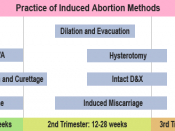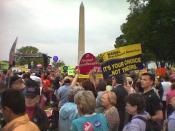In 1973, the Roe versus Wade case was a milestone for all pro-choice advocates. The United States Supreme court ruled that all state laws that prohibit or restrict abortion were unconstitutional and as a result, were overturned. Under the 14th Amendment, the court found that such laws are a violation of a person's constitutional right. The amendment states as follows:
All persons born or naturalized in the United States, and subject to the jurisdiction thereof, are citizens of the United States and of the State wherein they reside. No State shall make or enforce any law which shall abridge the privileges or immunities of citizens of the United States; nor shall any State deprive any person of life, liberty, or property, without due process of law; nor deny to any person within its jurisdiction the equal protection of the laws.
This controversial decision sparked a decades-long debate that has divided our country into pro-life and pro-choice.
The question as to whether or not abortion should be legal has since spawned many other questions, such as, "When does human life begin" and "Should religion play a role in making such laws."
First, "pro-abortion" is an incorrect term coined by right to lifers (www.wcla.org). It implies that abortion is favored over childbirth, which is certainly not the case (www.wcla.org). Pro-choice would be the correct term because it accurately expresses where we stand on a woman's right to choose (www.wcla.org). The term pro-life is used to make the anti-abortionists seem good and righteous (www.wcla.org). It is merely propaganda, just like the undocumented, abhorrently enlarged and mislabeled photographs of bloody abortions, overdeveloped fetuses, tiny feet, et cetera (www.wcla.org).
One of the pro-life arguments against abortion is that once a fetus is conceived, it is considered a human being, making abortion murder. Pro-lifers...


